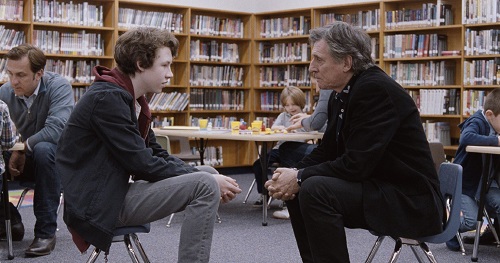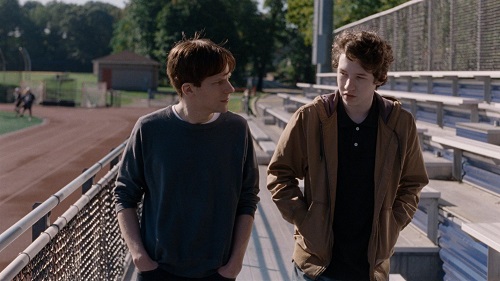Synopsis: The fractious family of a father and his two sons confront their different feelings and memories of their deceased wife and mother, a famed war photographer.
Release Date: April 29, 2016 MPAA Rating: PG-13
Genre(s): Drama,
Film Review

Production
Louder Than Bombs takes place three years after the death of war photographer Isabelle Reed (Amour‘s Isabelle Huppert), who, after surviving the treachery of her career, was actually killed in an automobile accident shortly after retiring. Isabelle left behind a husband named Gene (Gabriel Byrne from The Usual Suspects) and two sons, Jonah (The Social Network‘s Jesse Eisenberg) and Conrad (Devin Druid from “Olive Kitteridge”). All three are still grieving over the loss, and Gene struggles to connect with youngest son Conrad while older son Jonah helps out while he can, but between teaching college and having just had a baby of his own, his hands are full. The situation is made more complicated when one of Isabelle’s co-workers, a man named Richard Weissman (Lincoln‘s David Strathairn), wants to write an article and put on a retrospective show of Isabelle’s photos. As the family sorts through Isabelle’s pictures, they find images of a very damaged and unhappy woman, and they start to question the circumstances surrounding her death.and her life.
The screenplay for Louder Than Bombs was written by Joachim Trier (who also directs) and Eskil Vogt (who also collaborated with Trier on Oslo, August 31st and Reprise). It’s essentially a story about a family that is trying to get over a tragedy, showing the different ways in which each person deals with their confusion, anger, and grief. It’s a pretty standard tale, but Louder Than Bombs is anything but a standard movie.

Every character in Louder Than Bombs is somehow flawed, yet they are all still likeable and, therefore, they all find a connection with the audience. It’s difficult to pick a side, because they’re all wrong in some way, but they all elicit sympathy because of the circumstances. Conrad’s teenage rebellion is just as understandable as Gene’s smothering fatherhood and Jonah’s dereliction of his own new family. And the viewer doesn’t hold any of it against any of them.
The central idea behind Louder Than Bombs is that of framing; much like Isabelle would frame her photographs to show exactly what she wanted to show, each member of the family framed her in the way that they wanted to see her. Of course, some of the views are more positive than others, so the characters deal with the aftermath of her death differently, but the basic gist of the movie is that one person can be seen from various angles, so several impressions are given. The point of view at which anything is looked can change the meaning. And, in the case of Louder Than Bombs, it causes stress and strife amongst the survivors.
Although Louder Than Bombs deals with a painful subject, it’s not an altogether depressing movie. It can’t really be called uplifting, but it’s not a huge downer, either. It’s basically a movie about growing up and growing old – for both the kids and the adults. Louder Than Bombs is a coming-of-age tale for every phase of life.

Directing
Director Joachim Trier takes a clever, non-linear approach to Louder Than Bombs that helps tell the story from every character’s viewpoint. The timeline flip-flops a lot, first showing events from one character’s perspective, then showing the same events through another character’s eyes. For example, at one point, Gene follows Conrad to see what he does after school, calling him on his cell and talking to him while, unbeknownst to the boy, he’s watching him. Well, Trier shows the audience the same exchange between the characters, but from Conrad’s point of view, which vastly changes Gene’s side of the conversation. Trier also uses Isabelle’s photographs to introduce her as another character, so while the viewer gets to see the mother in flashbacks and dream sequences, they learn more about her through her art and work. Louder Than Bombs has a more subtle non-linear narrative than something like, say, Pulp Fiction, but Joachim Trier uses his timeline to show the whole story from every angle, so it works beautifully.

Cast and Crew
- Director(s): Joachim Trier
- Producer(s): Joshua AstrachanAlbert BergerAlexandre Mallet-GuyThomas RobsahmMarc TurtletaubRon Yerxa
- Screenwriter(s): Joachim TrierEskil Vogt
- Story:
- Cast: Gabriel Byrne (Gene)Isabelle Huppert (Isabelle)Jesse Eisenberg (Jonah) Devin Druid (Conrad)Amy Ryan (Hannah)Ruby Jerins (Melanie)Megan Ketch (Amy)David Strathairn (Richard)Rachel Brosnahan (Erin)Russell Posner (Kenneth)Harry Ford (Ralph)
- Editor(s): Olivier Bugge Coutté
- Cinematographer: Jakob Ihre
- Production Designer(s):
- Costume Designer: Emma Potter
- Casting Director(s): Laura Rosenthal
- Music Score: Ola Fløttum
- Music Performed By:
- Country Of Origin: NorwayFrance
